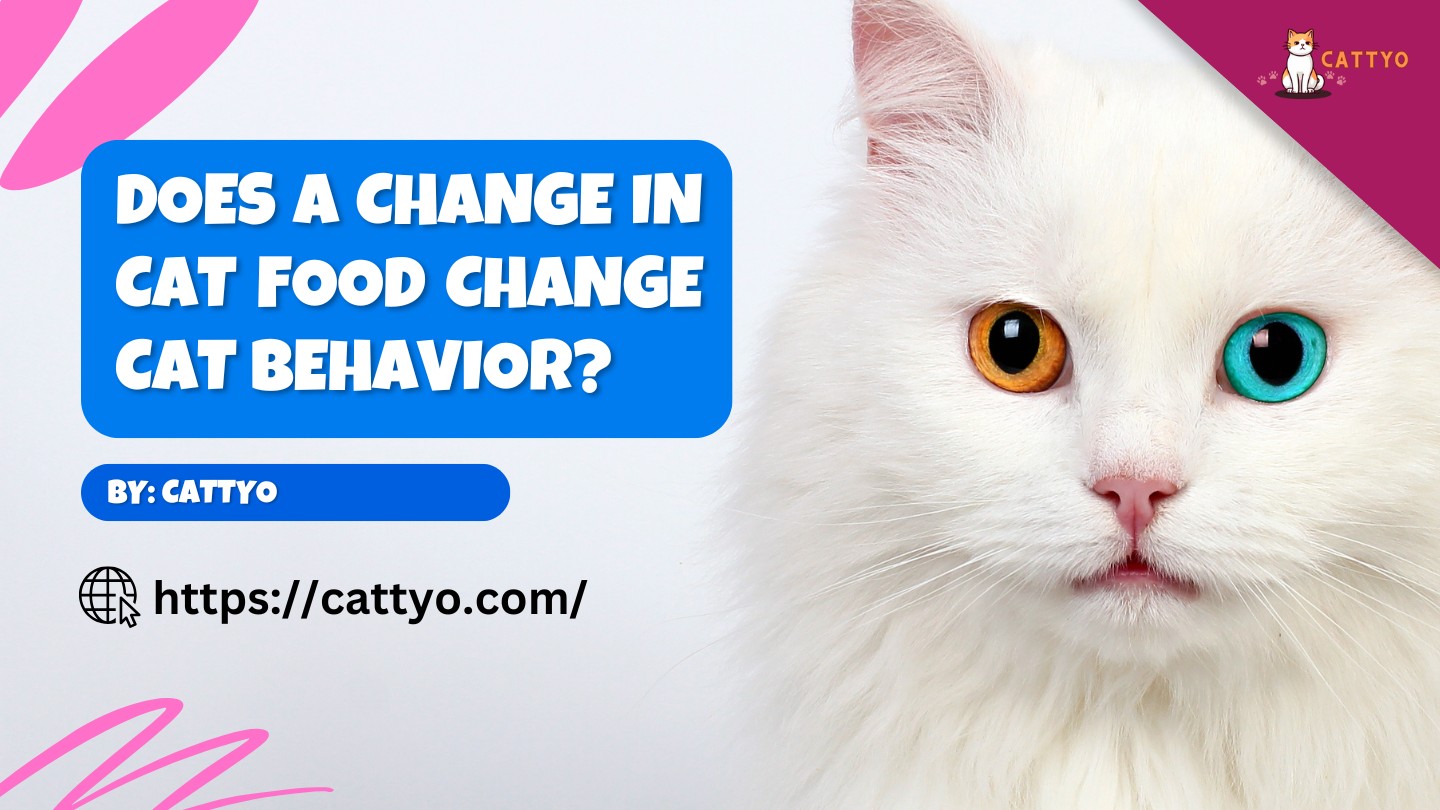If you’ve ever changed your cat’s food, you’ve probably noticed that it can sometimes have unexpected consequences.
sudden bursts of energy to a more laid-back attitude, you might wonder: Does a change in cat food change cat behavior?
Let’s explore this fascinating topic and break down why something as simple as switching up your feline friend’s diet might have a big impact on their behavior.
Whether you’re a long-time cat owner or a newbie just starting to explore the world of pet care, understanding the link between food and behavior is key to keeping your cat happy, healthy, and well-adjusted.
So, grab a cup of coffee (or tea) and let’s dive in to see how a change in cat food can shape your pet’s personality!
The Link Between Diet and Behavior
Just like humans, cats are affected by what they eat. Their food doesn’t just fuel their bodies—it influences their mood, energy levels, and even how they interact with you and their environment.
The idea that diet influences behavior isn’t just a theory; there’s science behind it.
The brain needs a steady supply of nutrients to function well, and that includes the neurotransmitters responsible for regulating mood and energy.
So, what happens when you change your cat’s food? Let’s take a closer look at how diet might influence their behavior.
1. The Science of Cat Behavior and Nutrition
Before we get into specifics, it’s important to understand the relationship between food and behavior on a neurological level. Cats, like humans, rely on a variety of nutrients for brain health, including:
- Amino acids: These are the building blocks of neurotransmitters, which are chemicals that help the brain communicate. Tryptophan, an amino acid found in some meats, is particularly important for producing serotonin, the “feel-good” hormone.
- Fatty acids: Omega-3 and Omega-6 fatty acids are crucial for brain health, cognitive function, and even mood regulation. A lack of these essential fats can lead to irritability and anxiety.
- Vitamins and minerals: A deficiency in vitamins like B1 (thiamine) or magnesium can lead to poor energy levels, lethargy, or even behavioral issues like aggression or depression.
If your cat’s new food lacks these essential nutrients, you might start seeing changes in their behavior—either positive or negative.
Changes in Cat Behavior After Switching Food
So, how exactly does a food change affect your cat’s day-to-day behavior? Let’s break it down into some common changes that might occur when you switch up their diet.
2. Increased Energy and Playfulness
One of the most noticeable changes that pet owners report after switching cat food is an increase in energy levels.
If your cat is suddenly more active and playful, it could be due to an improvement in their diet.
Food that’s rich in protein and essential fats, like high-quality meat-based diets, can lead to bursts of energy and enthusiasm.
Why does this happen?
- Better protein quality: Cats are obligate carnivores, which means they thrive on high-protein diets. Protein is essential for muscle repair, energy production, and overall vitality. If you’ve switched to a high-protein cat food, your kitty may have more fuel to play and explore.
- Balanced nutrients: If the food contains the right mix of vitamins and minerals, it can help regulate your cat’s metabolism, leading to more energy and enthusiasm for play.
3. Sudden Lethargy or Sluggishness
On the flip side, some cats may become lethargic or sluggish after a food change.
This is particularly common when switching from a high-protein, nutrient-dense food to a lower-quality, less balanced option.
You might notice that your cat isn’t as interested in their toys, or they may sleep a lot more than usual.
Why does this happen?
- Nutrient imbalance: If the new food lacks the necessary nutrients your cat needs, their energy levels might drop. A deficiency in protein or essential fats can result in fatigue, as their body doesn’t have the fuel it needs for energy.
- Overfeeding: Sometimes, switching to a new food with a higher calorie content might result in overeating, which can lead to weight gain and, consequently, sluggishness.
4. Aggression or Irritability
Behavioral changes like increased aggression or irritability are often seen when a cat is dealing with an imbalance in their diet.
For example, a cat that isn’t getting enough taurine, an amino acid essential for heart and eye health, may show signs of aggression or stress.
Why does this happen?
- Nutrient deficiencies: A lack of essential nutrients like taurine, magnesium, or vitamins can make cats feel uncomfortable, which may manifest as aggression.
- Food allergies or sensitivities: Cats can be sensitive to certain ingredients in their food, such as grains, artificial preservatives, or certain proteins. If they have an adverse reaction to their new food, they might become irritable or exhibit unusual behaviors.
5. Changes in Appetite and Eating Habits
Another common behavior change associated with a food switch is a shift in appetite. Some cats may love their new food, eating eagerly, while others may refuse to eat it entirely.
Why does this happen?
- Taste preferences: Cats are creatures of habit, and they tend to be picky eaters. If the new food doesn’t match the taste or texture they’re used to, they might turn up their noses.
- Digestive issues: Changing a cat’s food too quickly can cause gastrointestinal upset, including nausea, diarrhea, or constipation. Cats might eat less if they associate the new food with discomfort.
6. Better Socialization and Bonding
If your cat’s behavior improves after a food change, it could positively affect how they interact with you and others.
A more satisfied, healthy cat is more likely to seek attention and engage in playful activities with their owners.
Why does this happen?
- Improved health: When cats feel good, they are generally more affectionate. A balanced diet that supports their overall health can lead to a happier, more social cat who’s eager to interact.
- Comfort and trust: If the new food helps resolve previous health issues (like digestive problems or skin irritations), your cat may feel more comfortable and secure, which makes them more inclined to bond with you.
How to Choose the Right Food for Your Cat
Changing your cat’s food can have both positive and negative effects on their behavior. The key is to choose a food that supports their individual needs. Here are some factors to consider when selecting a new food:
7. Quality Ingredients
Look for high-quality, protein-rich foods that are specifically designed for cats. Cats require protein, fats, vitamins, and minerals to thrive, so choosing a food that meets these needs is essential.
8. Gradual Transition
If you’re switching your cat’s food, make sure to do it gradually. Sudden changes can upset their stomach and lead to unwanted behavior changes. Mix the old food with the new food over the course of a week to allow your cat’s digestive system to adjust.
9. Special Diets for Special Needs
If your cat has specific health issues (e.g., allergies, digestive issues, or weight problems), consider choosing a food that addresses those needs. Consult with your veterinarian for recommendations.
FAQs About Changing Cat Food and Behavior
Does a change in cat food cause stress?
Yes, it can. Cats are creatures of habit, and sudden changes in their environment—including their food—can cause stress. Always transition slowly to avoid overwhelming your cat.
Can I switch my cat’s food to improve their behavior?
If your cat is experiencing issues like lethargy, aggression, or poor socialization, switching to a higher-quality, nutrient-rich food might help. However, if behavior issues persist, it’s best to consult with a veterinarian.
How long does it take for a food change to affect a cat’s behavior?
Behavior changes can take anywhere from a few days to a few weeks, depending on the cat. Give them time to adjust, and keep a close eye on their behavior during the transition.
Conclusion:
To answer the question—does a change in cat food change cat behavior?—the answer is a resounding yes! Food plays a crucial role in a cat’s mood, energy levels, and overall behavior.
The nutrients in their food affect everything from their brain chemistry to their physical health, influencing how they interact with the world around them.
So, next time you think about changing your cat’s food, remember that it could lead to more than just a healthier coat or weight loss. It might just change how your furry friend behaves, too.
Whether you’re hoping for more playfulness or a calmer kitty, the right food can make a big difference.
Just be sure to introduce it gradually and choose one that’s packed with the nutrients your cat needs to stay happy and healthy.





